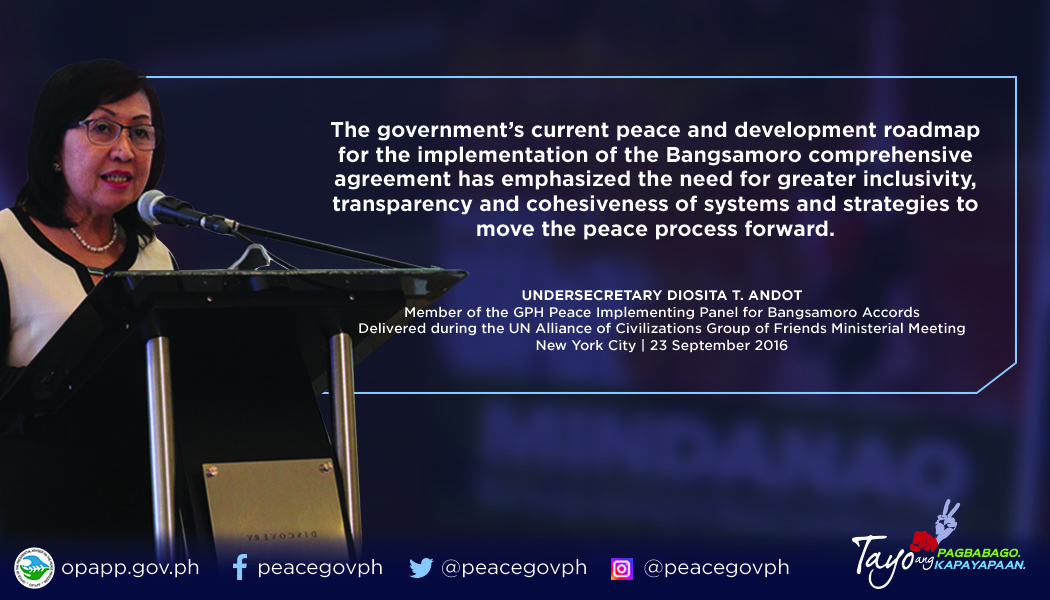Remarks of Usec. Diosita Andot at the UN Alliance of Civilizations (UNAOC) Group of Friends Ministerial Meeting
On the theme “COUNTERING XENOPHOBIA THROUGH FOSTERING INCLUSIVE DIALOGUE”
New York City | 23 September 2016
At the outset, allow me first to thank the organizers of this event particularly the UN Alliance of Civilizations Group of Friends for this opportunity to share the Philippine experience in countering xenophobia. The discussion of such theme is indeed timely as many countries now around the world are feeling the impact of violence brought about by intolerance and irrational resentment of some people against other groups of people or culture.
The people of the Philippines are as diverse as the 7,500 islands that constitute our country. As a multi-cultural nation, it has faced disunity, divisiveness and even armed conflicts due to differences in political beliefs and cultural systems. At certain times in our history, these differences have given rise to extreme dislike and fear particularly between the Christian and non-Christian populations in Southern Philippines. This dispersion emanated from a period in our history when the early Filipinos were subjugated under foreign rulers. Our Islam-believing forefathers in the south fought first against the Spaniards, and later, the American colonizers for roughly 400 years even as their compatriots in the north fell under the control of the much stronger force of the colonizers, and eventually comprise what is now referred to as the Christian Filipinos. The Muslim Filipinos were feared for their fierceness in the battlefields and for their relentless militant campaign against the invaders. Their resistance later morphed into the wars for independence against the Philippine state which their early leaders believe to have inherited the discriminatory and oppressive character of the foreign colonizers. This resulted to a protracted conflict that not only pitted the Moro rebels against the Philippine Government but has also planted the seeds of intolerance, prejudices, discrimination and latent fear between Christians and Muslims to this day.

The Philippine Government is approaching this divide in two ways: via political means through the peace process with the Moro rebels, and through socio-cultural-based approaches that employ constructive engagements and dialogic processes between the differing parties. The government’s current peace and development roadmap for the implementation of the Bangsamoro comprehensive agreement has emphasized the need for greater inclusivity, transparency and cohesiveness of systems and strategies to move the peace process forward. For the crafting of the new enabling law for the Bangsamoro, a Transition Commission has been formed consisting of 21 members representing the different Bangsamoro rebel fronts, the sultanates, the indigenous peoples, the local governments, and other key actors to ensure there is genuine distribution of their mandate among the stakeholders and allow the voices of everyone to be heard in the formulation of the Bangsamoro Basic Law.
Continuing dialogues and people conversations are key components of this track. It is essential that other stakeholders are involved in the peace process in more meaningful and innovative ways. This is being done by initiating and supporting 1) inter-faith and intra-faith discourses, (2) youth-focused interactive conversations, (3) community-based cultural tours and exchange visits, (4) people-to-people mobilization to educate and promote tolerance and moderation, and (5) establishment of spaces for peace or zones of peace where violent expressions and issues of conflict are deconstructed, resolved and transformed.
It is important that civil society groups, the religious and the academic sectors are drawn into participating and supporting this process. The youth who are vulnerable to recruitment of radical groups are particularly targeted in the drive to counter extremism and intolerance. And more importantly, involve and empower the women to lead in this effort, from the policy level to the community and family levels, to tap their innate capabilities in relationship and harmony building. This we have proven when we launched and supported the Mothers for Peace Movement which successfully brought back the MILF and the Philippine Government back to the negotiating table after a long impasse in 2008-2010. The mothers in the movement initiated dialogues and woman-to-woman conversations with mothers in non-conflict and conflict zones to build a new and stronger constituency for the resumption of talks. Our common vision is to propagate peace as a way of life—to be able to impress on everyone that there is strength in diversity and that cultural understanding and acceptance of our differences are the bedrocks of sustainable peace and development for all humanity.
Our common vision is to propagate peace as a way of life—to be able to impress on everyone that there is strength in diversity and that cultural understanding and acceptance of our differences are the bedrocks of sustainable peace and development for all humanity. Thank you and good afternoon. ###
Thank you and good afternoon. ###











